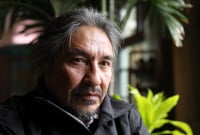Support strong Canadian climate journalism for 2025
Finally, someone listened. This week, Environment Minister Steven Guilbeault announced up to $12 million for a decade-long study into the health and environmental impacts of oilsands contaminants.
For people of the Athabasca Chipewyan First Nation, Mikisew Cree First Nation and Fort Chipewyan Métis Nation, the news is an overdue validation of concerns they have voiced for decades about the prevalence of cancer in their community.
This study should have happened years ago, when the alarms were first raised. In 2009, an Alberta health survey of people in the region found cancer rates were indeed higher than average. But because the sample size was small, the results were brushed aside and calls for a more detailed Health Canada study went ignored.
So credit is due to Guilbeault for finally paying attention to the communities who live close to the toxic soup of mercury, benzene and arsenic that we know sometimes leak from the oilsands tailings ponds.
Guilbeault ordered a federal investigation when he found out Imperial Oil and the Alberta Energy regulator failed to adequately alert neighbouring First Nations about a massive tailings leak that seeped into waterways for nine months.
And now, he has ensured serious attention will be paid to potential health impacts of current and historical oilsands contamination. But vigilance is still needed to make sure the study is done — and done right — regardless of who is in government years from now.
This week, Imperial Oil assured the public they will support and cooperate with the study, but insisted the company’s monitoring shows everything is fine. "The mitigation measures put in place are working and all monitoring data continues to demonstrate no indication of adverse impacts to local wildlife or fish populations in nearby river systems, and no risks to drinking water for local communities,” Imperial spokeswoman Christine Randall wrote in a statement.
Hopefully, these assurances will prove true. But they ring a bit hollow coming from a company that, despite a contract with the Chipewyan First Nation requiring Imperial to inform them of any spills, there was only one email sent from the oil giant or government about the months-long tailings leak.
Blame here must be equally shared by the Alberta Energy Regulator, which also knew about the spill and flat out failed in its duty to protect the public. When the regulator’s CEO, Laurie Pushor, testified at the House of Commons in the spring of 2023, he ducked most questions, saying he couldn’t answer because of an ongoing third-party review. That angered a number of MPs in the room who rightfully characterized the testimony from Pushor and Imperial’s CEO Brad Corson as “evasive.”
Until now, successive Alberta and federal governments have given the oilsands companies an easy environmental ride, possibly fearing that too much scrutiny could jeopardize a huge economic driver. As recently as this summer, opposition MLAs complained the provincial energy regulator’s independence is being undermined. With a provincial government hellbent on protecting the oil and gas industry at almost any cost, and without a strong regulator, it’s hard to imagine that anyone — except, now, the feds — are questioning Imperial’s assurances the spill didn’t impact local First Nations’ water or food supply.
And while this most recent leak has nothing to do with cancers twenty years ago, historically, something has been driving up the rates in these northern First Nations.
Their physician, Dr. John O’Connor, long suspected there may be a connection between the incidence of rare cancers and the oilsands industry and for decades demanded more scrutiny. His crusade almost lost him his medical license for raising ‘undue alarm.’
O’Connor was exonerated by the health study and won a whistleblower’s prize in 2021, during the height of the COVID-19 pandemic. When the award was granted, Athabasca Chipewyan First Nation Chief Allan Adam thanked O'Connor for helping draw attention to cancer in the oilsands.
The chief noted that day that more of his community are dying from cancer than the COVID-19 virus. "Nobody's doing nothing about it... it seems like government and industry work hand in hand."
Until this past couple of years, those words rang all too true. Let’s hope this week is a turning point.






Comments
The displacement of fossil fuel demand with clean renewables can't come soon enough.
Still, once that occurs, and it may occur at an unanticipated pace too rapid for the oil and gas industry and their government employees to plan ahead, what will motivate them to stick around and clean up their mess? Nearly 80% of oil companies operating in Alberta are majority foreign owned. How committed are they to honour an ethical principle in a jurisdiction that is not their home base?
We already know how committed they are...NOT. Just ask Alberta and Saskatchewan how many orphan wells they have whose "owners" just up and drove away in their pickups leaving their junk behind. Most were small independent outfits but they got away with it. Just imagine trying to make all the giants behave themselves, I wager there are few Canadians left who believe anything BIG OIL says or that they will honour any commitment. Ain't gonna happen - unless we start jailing their CEO's right now..
That anyone still believes BIG OIL is an economic driver rather than a stinking tar pit that gobbles up Taxpayer$$$$$$$, is hard to believe. These pirates have buried their treasure on remote islands. With any luck rising oceans will swamp and scatter their filthy lucre.